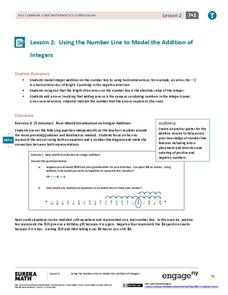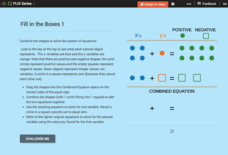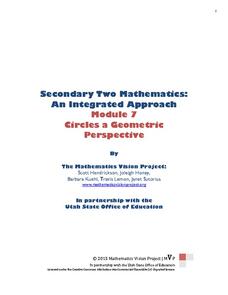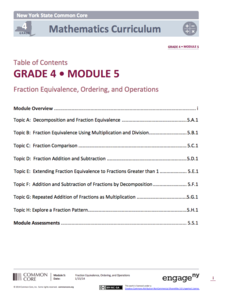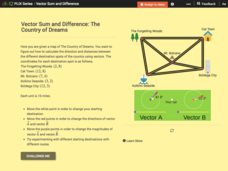EngageNY
Using the Number Line to Model the Addition of Integers
The second lesson in a series of 25 shows the class how to use arrows and a number line to add integers. Learners apply their knowledge of the commutative property and absolute value in their explanations. Classmates play the integer...
Laura Candler
Fishbowl Multiplication
Transition young mathematicians from using repeated addition to multiplication with this fun, hands-on activity. Using manipulatives and the included game board, students work in pairs modeling repeated addition problems before...
EngageNY
Addition and Subtraction of Rational Numbers
Apply addition and subtraction of integers to solve problems with rational numbers. Pupils apply the rules for adding and subtracting integers to add and subtract rational numbers. Class members represent the problem with equations and...
EngageNY
Relationships Between Quantities and Reasoning with Equations and Their Graphs
Graphing all kinds of situations in one and two variables is the focus of this detailed unit of daily lessons, teaching notes, and assessments. Learners start with piece-wise functions and work their way through setting up and solving...
CK-12 Foundation
Two-Step Equations with Addition and Multiplication: T-Shirt Equation
Interactive bar models make solving equations fairly easy. Scholars use an interactive to adjust a bar model representing an equation. This model helps solve the equation.
EngageNY
Writing and Evaluating Expressions—Multiplication and Addition
How many people can sit around a table? The 22nd part in a series of 36 continues the work on writing and evaluating expressions to include expressions with two operations. Pupils use models to determine an expression for the number of...
CK-12 Foundation
Linear Systems with Addition and Subtraction: Fill in the Boxes 1
Eliminate a color by dragging shapes. The interactive provides a graphical color display that allows for pupils to solve a linear system by elimination. Learners combine figures following set rules for positive and negative shapes. The...
EngageNY
Replacing Letters with Numbers II
Teach about properties properly. Individuals investigate the commutative and identity properties for both addition and multiplication. They see that the properties hold true for all values by using substitution to test out several examples.
Scholastic
Adding and Subtracting Ten
Developing fluency with basic addition and subtraction is fundamental to the success of all young mathematicians. This four-day lesson series begins with learners using ten-frames and hundreds charts to recognize patterns when adding and...
CK-12 Foundation
Linear Systems with Addition and Subtraction: XYZ Tiles
Cover it up to reveal the values of variables. Using arrangements of colored tiles representing algebraic expressions, pupils layer them over each other to determine the values of variables. The procedure models the elimination method in...
CK-12 Foundation
Linear Systems with Addition and Subtraction: Fill in the Boxes 2
Systematically combine shapes to arrive at one solution. The resource models a system of linear equations using colored shapes. Pupils follow rules to combine circles and squares to add the two equations together, resulting in one...
CK-12 Foundation
Additive and Multiplicative Rules for Probability: Red Dress? Blue Dress? Both!
The sum of the parts is greater than the whole. An interactive uses a Venn-like model to show the percentage of females from a survey that have a blue dress, a red dress, or both. The pupils determine the numbers in each category...
Kenan
Respiratory System
Explore the respiratory system with a model. First, pupils build a set of lungs to experiment how they inflate and deflate. Then, they delve deeper into the topic with a web quest to discover new information about the nose, trachea, and...
Mathematics Vision Project
Circles: A Geometric Perspective
Circles are the foundation of many geometric concepts and extensions - a point that is thoroughly driven home in this extensive unit. Fundamental properties of circles are investigated (including sector area, angle measure, and...
EngageNY
The Relationship of Division and Subtraction
See how division and subtraction go hand-in-hand. The fourth installment of a 36-part module has scholars investigate the relationship between subtraction and division. They learn using tape diagrams to see that they can use repeated...
EngageNY
Fraction Equivalence, Ordering, and Operations
Need a unit to teach fractions to fourth graders? Look no further than this well-developed and thorough set of lessons that takes teachers through all steps of planning, implementing, and assessing their lessons. Divided into eight...
National Math + Science Initative
Introduction to Decimals
Three activities make up an introductory instructional activity designed to create a strong foundation in comparing fractions to decimals and exploring and building decimal models. Pupils brainstorm and complete a Venn diagram to show...
Anchorage School District
Transition and Closing Words
Provide young writers with a printable that lists suggestions for and examples of transitional sets and closing words. Also included are some suggestions for what to avoid in closing paragraphs.
CK-12 Foundation
Vector Sum and Difference: The Country of Dreams
Find your way around using vectors. Scholars use an interactive to learn about vector addition. They answer a set of questions about modeling a route on a map using vectors.
CK-12 Foundation
The Real Numbers: Adding Electrons
Get a charge out of a great resource! Scholars use an interactive to explore addition and subtraction of integers. They add or remove electrons in an atom model to consider its charge.
Illustrative Mathematics
Planes and Wheat
Understanding government spending is difficult. The number of variables can be enormous. In the corresponding resource, number crunchers are given one equation related to government spending with a number of variables. Your class is...
EngageNY
Even and Odd Numbers
Even or not, here I come. Groups investigate the parity of products and sums of whole numbers in the 17th lesson plan in a series of 21. Using dots to represent numbers, they develop a pattern for the products of two even numbers; two...
US Department of Education
A Close Reading of Lincoln’s Gettysburg Address
Abraham Lincoln's Gettysburg Address provides the text for a series of close reading exercises that model for instructors how carefully crafted guiding questions can help readers think critically about what they read, thus developing...
National Humanities Center
Teaching The Great Gatsby: A Common Core Close Reading Seminar
The 41 slides in a professional development seminar model how to use close reading techniques to examine the many layers of F. Scott Fitzgerald's The Great Gatsby. In addition to passages from the novel, slides provide biographical...
